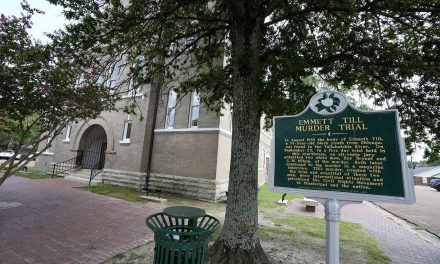
The lame-duck legislation session that came at the end of 2018, in which Wisconsin’s Republican lawmakers placed restrictions on the incoming Democratic governor and Attorney General, is instructive by its example.
I have listened to the complaints of white Democrats who speak of the unfairness of this “power grab” as they call it. “How dare Governor Scott Walker and the Republican led Legislature change the rules? Don’t they understand the un-democratic nature of what they’ve done? What about the will of the people who voted Tony Evers and Josh Kaul into office?”
For those of us in the non-white community, this changing of the rules is very familiar. In fact it is business as usual.
Those whites that call themselves “progressives” are walking around threatening lawsuits to overturn these brazenly unfair new rules that restrict the power of the Democrats who swept the Wisconsin midterm elections. This appears to be “sour grapes” by a defeated Republican governor, as he leaves office after eight years of having near total control of the governance of Wisconsin – along with his Republican buddies in Madison.
“They can’t just change the rules,” I have heard people exclaim. “This goes against the ideals of our Democratic norms,” others have said. Social media posts disparaging this ruthlessly inequitable new set of rules have been all the rage. Even some Republicans have chimed in on how wrong this is. I think they are afraid of tit-for-tat reactions if, by some un-gerrymandered miracle, Democrats ever regain control of the Wisconsin Senate and Assembly.
Nationwide media has reported on this trick the Republicans are playing in Wisconsin and Michigan. Despite the complaints, Walker signed these changes into law, restricting the powers of Evers and Kaul as well as changing the length of early voting to only two weeks. In most places around the state that is the norm. However, heavily democratic Milwaukee and Madison allow six-weeks of early voting. In 2016 a similar measure to limit early voting was ruled unconstitutional
Former U.S. Attorney General Eric Holder is part of a group that has already filed a lawsuit to challenge this change. According to the Journal Times:
“U.S. District Judge James Peterson, in striking down the two-week early voting limitation in 2016, said then that the move was designed by the Republicans who passed it to give them a partisan advantage and limit the ability of African Americans and Hispanics living in Wisconsin’s largest cities to vote.” Holder says Walker and Republicans showed a “blatant disregard for a previous court ruling and refusal to listen to the will of the people.” Calling it “another shameful mark on the legacy of Scott Walker and his allies in the Legislature.”
To those paying attention, it is a blatant attempt to limit the power of the black and Hispanic vote. Taking away the power these groups have to influence Wisconsin elections is an obvious and well-used ploy. In North Carolina during the 2016 elections, Republicans used a similar lame- duck session to do the exact same thing that Wisconsin Republicans just did. Lawsuits were filed and are still tied up in the courts to this day. Wisconsin Republicans have not created some new tool. Most of the complaints I have heard seem to act as if this is something new.
Changing the rules in the middle of the game is as old as America. All you have to do is take a look at American history to see constant examples of people of color having the rug pulled from under them by whites. These are the tricks we are very familiar with. When whites arrived on the shores of this land, they “named” it America and then began to change rules to benefit themselves. Ask the Indigenous people about how those treaties they signed with the English, French, Dutch, and Spanish worked out.
The promises made by white governments were broken consistently. Native lands would be taken by hook and crook for centuries. We celebrate the founding of the United States while ignoring that the land we all stand on was stolen from the original inhabitants of this beautiful place. Americans love to say “God Bless America.” Did God bless how America became what it is? Did the Creator of Life somehow overlook the genocide and land grabs that allowed a place occupied by millions of Indigenous peoples, who lived for centuries in hundreds of thriving communities, to be overrun by Europeans? Was the spiritual belief in Manifest Destiny that we learned in school outlined somewhere in the Bible?
These are hard truths that many Americans are not willing to acknowledge. The enslavement of African captives and Indigenous people was legally sanctioned for hundreds of years. When rules dictated that Christians could not be enslaved, many Africans and Native people became Christians to gain their freedom. And guess what? The rules were changed to apply to whites only.
Throughout American history citizenship rules have dictated who had certain rights. Only citizens have particular rights under the law. The 14th Amendment to the Constitution stated that all “persons born or naturalized in the United States, and subject to the jurisdiction thereof, are citizens of the United States and of the State wherein they reside.”
Despite this, Asians born in the country have been denied citizenship rights. A famous Supreme Court case, US v. Wong Kim Ark. in 1898 challenged whether a Chinese American citizen would be allowed citizenship rights after visiting his parents in China and denied re-entry under the infamous 1882 Chinese Exclusion Act which barred Chinese immigration to the U.S. until 1943. The U.S. Supreme Court ruled in Wong’s favor. “It is conceded that, if [Wong] is a citizen of the United States, the acts of Congress, known as the Chinese Exclusion Acts, prohibiting persons of the Chinese race, and especially Chinese laborers, from coming into the United States, do not and cannot apply to him,” the majority wrote.
This protection is under threat by Donald Trump. He wants to turn back the clock on birthright citizenship as part of his attacks on immigration. On October 30, he falsely claimed that no other nation provides birthright citizenship, even though one in four countries do so. Once again we see a clear example of an attempt to change the rules in the middle of the game. I have seen very little outrage over this.
Asians who had white skin argued that they should be citizens because the 1790 Naturalization Law deemed only whites as capable of becoming citizens. In 1922, a Japanese businessman Takao Ozawa filed for U.S. citizenship. He argued that people of Japanese descent should be classified as white. Associate Justice George Sutherland however, ruled that only Caucasians were white, and therefore the Japanese could not be considered white but rather were of an “unassimilable race,” not covered by any Naturalization Act of 1790. Even though “science” at the time proved Japanese were “white” biologically, Ozawa was denied citizenship.
In a similar case only a few months later, United States v. Bhagat Singh Thind, the court determined that South Asian Indians were Asian for the first time, allowing previously naturalized Asian Indians to be stripped of their American citizenship. Once they had been stripped of their citizenship, Indian landowners became subject to the California Alien Land Law and similar laws that said only citizens could legally own land. The Asiatic Barred Zone Act of 1917 prevented new Asian immigration to the U.S. and most Asian Indians left the U.S. By 1940 their population was reduced by half to 2,405.
When the 15th Amendment to the U.S. Constitution gave black men the right to vote in 1870, it changed the racial dynamics of voting throughout the South where most blacks resided. Black men were elected to public office all over the region. As formerly enslaved blacks were a majority of the population in several states, they had significant influence in elections. In my home state of Mississippi, Hiram Revels became the first black member of the United States Congress joining the Senate in February 1870, and Blanche Bruce became the second black Congressman the same year. Joseph Rainey of South Carolina was elected to the House of Representatives in 1870 as well. Throughout the South, black elected officials became the norm.
However, that did not last. Whites were determined to change the rules so that blacks would be disenfranchised. As the last of the federal troops were removed from the South after the Compromise of 1877 things changed quickly. The Compromise was the result of the disputed election of 1876 where Republican Rutherford B. Hayes was awarded the White House over Democrat Samuel J. Tilden despite losing the popular vote. This scenario reminds me of the 2016 election “victory” by Donald Trump who lost the popular vote by about three million votes.
Beginning in 1890, Democratic state legislatures disenfranchised millions of blacks and poor whites by changing the rules about who could vote. Poll taxes, literacy tests, and other intentional acts were put in place to return the franchise to whites throughout much of the South. The only places blacks had a chance to be elected were the places where millions of blacks fled to, running away from the violence and constant humiliation of Jim Crow.
The Spanish American War of 1898 allowed the United States to gain possession of Puerto Rico from its former colonial master, Spain. Many Americans are unaware that Puerto Ricans are U.S. citizens by law. Despite this designation, they are still second-class citizens while living in Puerto Rico. Residents of Puerto Rico and other U.S. territories do not have voting representation in the United States Congress, and are not allowed to vote for President because those “possessions” are not states. So you are a “citizen”, but by rule you do not have the same rights as other citizens. Changing the rules in the middle of the game once again.
In the early part of the twentieth century the labor of Mexicans was a critical component of the American economy. As long as their labor did not compete with “American” labor the nation allowed them to migrate freely. Intentionally racist Operation Wetback, under the Eisenhower administration deported millions of Mexicans, many of them U.S. citizens.
“Border Patrol agents and local officials used military techniques and engaged in a coordinated, tactical operation to remove the immigrants. Along the way, they used widespread racial stereotypes to justify their sometimes brutal treatment of immigrants. Inside the United States, anti-Mexican sentiment was pervasive, and harsh portrayals of Mexican immigrants as dirty, disease-bearing and irresponsible were the norm.” – The History Channel
The rules were changed in the middle of the game, much in the same way the Trump administration is currently re-writing rules. The ongoing immigration debates borrow from much of the same language used at that time. Rules created to allow refugees to flee horrible situations in majority non-white nations are being dismantled. Many from Latin America have been impacted, but we must also understand that former refugees from Southeast Asia, who have lived in the U.S. for decades, are facing deportation, as well as those from Haiti and places in the Middle East.
The Constitutional conventions of several states in the late 1800s were designed to create new rules that created all-white legislatures. The 1901 Alabama Constitutional Convention was called to establish “white supremacy” in the politics of the state by placing limits on black voting rights. As a leading historian recently noted, under this new government, “the rich, barring their own failure, would stay rich and the vast majority of poor Alabamians would stay poor.”
“White Supremacy, Honest Elections and the New Constitution, One and Inseparable.” – Slogan printed across envelopes sent out by the Alabama Democratic State Campaign Committee in the fall of 1901.
The Alabama convention concentrated power in the state legislature, and established new voter requirements. Sounds very similar to our recent “lame-duck” session that empowers the mostly white Republican Party of Wisconsin.
Let us not be ignorant of our history. New tricks are old tricks in a new package. The fact that the Republican Legislature of the state has gerrymandered its way into a position that nearly guarantees they will control the state government is not lost on people of color. We understand the racial ramifications of gerrymandering and voter ID laws very clearly. The lame-duck session is simply an extension of the shenanigans we have seen for many years in the formerly “progressive” state of Wisconsin.
It is time Democrats in Wisconsin and Michigan begin to connect the dots and learn from the experiences of people of color. We have been playing this game for 400 years. To complain about this as if it is happening within a vacuum is disingenuous. These are standard operating procedures.
I am asking white Democrats, how does it feel to be on the wrong side of these dirty tricks?
















